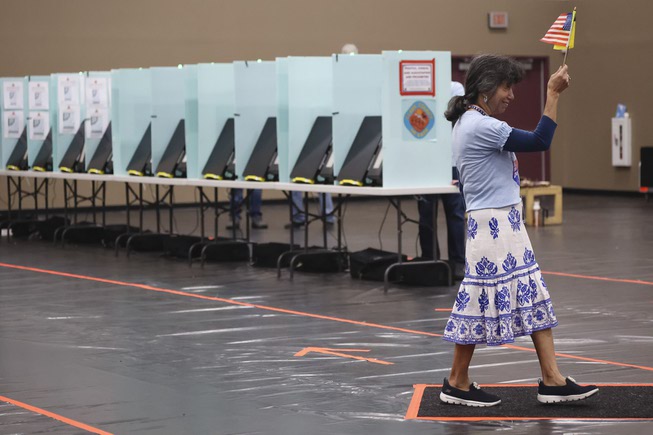
A election worker waits for voters at the Desert Breeze Community Center polling site on the last day of the Democratic presidential preference primary Tuesday, Feb. 6, 2024.
Sunday, April 7, 2024 | 2 a.m.
View more of the Sun's opinion section
As a College of Southern Nevada Women’s Alliance member and Vote Nevada’s executive director, I appreciate the Las Vegas Sun raising awareness about our recent candidate forum for local government races. I am sure the positive coverage boosted the number of candidates and voters who participated. Overall, 49 candidates in down-ballot races attended and demonstrated their dedication to our community.
While voter participation was steady throughout the event, it was not as high as I had hoped. So, we are redoubling our efforts to understand lagging community civic engagement because low turnout for civic events often aligns with the factors that suppress turnout in our primary election. My research on these factors includes work by my colleagues and diligent reporters, presentations I provide to various Nevada organizations, my experience as a history professor for 23 years at CSN North Las Vegas campus, and as a resident of east Las Vegas for 32 years.
Civic engagement among my students and in the neighborhoods around campus is not robust, but not because these populations are apathetic. I regularly hear about their concerns, but many Nevadans have become frustrated voters who stop participating due to competing work and life commitments, a lack of civics information, and an election system that often yells at them instead of listening.
Giving up on these voters is unacceptable because representative government is only healthy when we all feel empowered to be active civic citizens. Our governing systems become increasingly dysfunctional when fewer and fewer voices are heard. Recognizing this leads to the question: How do we encourage frustrated voters to engage in civic life? Not just vote in the general election because someone made them fearful or angry, but to participate fully in both the primary and general elections.
Focusing on electing new people or certain people or even giving power to one political party or the other is not working. Instead, we need voters who understand how our political and governing systems work, and we must embrace and respect every community member who engages in our electoral and governing processes.
Based on my experience with civics education in higher education and with the public, I have two recommendations for making civics information more accessible and for every community member to participate fully in civic life.
First, we need more publicly available civics education. Our higher education system should teach about civics in the classroom and be centers of civic activities. Too many higher education faculty and administrators fear backlash if they engage in civic processes on campus. I regularly search for partners to host candidate forums at the other Nevada System of Higher Education community colleges. Yet, with a few exceptions, I am either ignored or told that the institution’s administration does not allow faculty to engage in political activities. Allowing students and community members to communicate with candidates is not a political activity; in a forum setting, individual candidates are not being promoted or endorsed.
Higher education cannot focus solely on workforce development; civic citizenship development is also important. Community members need jobs, that is true, but they also need the tools to question candidates, analyze ballot questions, and engage in advocacy with elected officials.
Second, and related, because many people move to Nevada every year, many adults are new to Nevada’s way of running elections every cycle. Consequently, we need more resources for adult civics education.
Adult civics education must be robust for several reasons. First, our primary election process can be confusing. Some races are nonpartisan open primaries, while others are partisan closed primaries. For the voter, it is not obvious why the county commission races are closed primaries while the city council races are open. It can be difficult to differentiate between the two types of races and how the system connects a person’s voter registration status and access to voting.
Most voters are also unaware that we can elect candidates in our primaries. In 2022, students asked me why the Clark County sheriff’s race was missing from the general election ballot. When I explained that the sheriff had been elected in the June primary, they felt betrayed and asked, “Isn’t the primary a race that selects nominees to move forward to the general election?” I had to answer yes, but not in some primary races. Under this system, you can lose the right to vote in important races if you do not engage in the primary.
Mail-in voting can also be confusing. According to the secretary of state, around 5,000 mail-in ballots are thrown out every election cycle due to voter errors in completing and submitting their ballot. This is unacceptable and must be addressed with robust voter education.
Representative government relies on those represented being engaged. But to achieve this, our higher education system should be civic engagement centers that offer opportunities to listen to and speak with elected officials and candidates. We also need more resources for adult civics education that ensure eligible voters are not denied the right to vote due to the complexity of our election processes.
Sondra Cosgrove is executive director of Vote Nevada and a history professor at the College of Southern Nevada.
